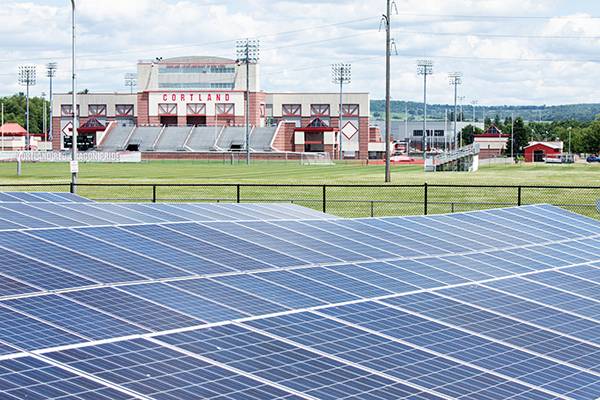
11/17/2025
SUNY Cortland further grew its Earth-friendly approach to education when it recently won funding from climate action nonprofit Second Nature.
Cortland was one of eight schools across the country to be awarded one of the Catalyst Grants, which are designed to serve as a “spark” that strengthens campus climate action projects.
The $3,500 from Second Nature will be split in half, with $1,750 to support a new student intern position that will analyze the success of the university’s sustainability efforts and $1,750 to strengthen the school’s support of local partner Cortland ReUse.
“The Catalyst Grant emphasizes collaboration between higher education and the community,” said Megan Swing, energy and sustainability engagement coordinator.
“Cortland ReUse has consistently been a supportive partner in efforts to reduce campus waste and divert it from the landfill. When we applied for this grant, we were hoping to strength the partnership and help support Cortland ReUse because of all the work they do with SUNY Cortland.”
Cortland ReUse joined SUNY Cortland’s Residence Life and Housing, Facilities Management and Sustainability offices to collect student residence hall donations in past Red Dragon ReUse Sale events, with more sales planned.
More than 40 tons of items were collected from SUNY Cortland at the end of the Spring 2025 semester, keeping them out of the trash and saving the university about $4,050 in landfill tipping fees.
One of the Sustainability Office’s main goals for the grant money is to encourage the idea of a “circular economy” that keeps products and materials in circulation longer through thrift stores and buying secondhand.
To better gauge the impact of ReUse sales and other green projects on campus, the new student intern will aid the Sustainability Office in developing common measurement metrics, develop measurement tools and create long-term project guidance for SUNY Cortland’s waste reduction and federally designated Scope 3 greenhouse gas goals that also align economic and health benefits. Scope 3 emissions are an organization’s indirect emissions caused by its supply chain, such as food purchases, office supplies and travel.
“Through our annual Catalyst Grants initiative, we’re able to empower colleges and universities to launch or scale projects that create meaningful, lasting climate impact,” said Tim Carter, president of Second Nature.
“This year’s recipients represent a diverse group of institutions tackling the urgent need to decarbonize, increase resilience and advance equity within their communities. Their creativity and commitment continue to drive higher education’s leadership in addressing the climate crisis.”
SUNY Cortland has been a leader in sustainability for many years. Among its accomplishments, the university:
- Signed the American College and University Climate Commitment, which commits the campus to pursue the elimination of its greenhouse gas emissions Currently, SUNY Cortland has reduced emissions by a third compared to 1990 baseline year.
- Became the first campus in the SUNY system to operate all of its facilities using 100% renewable electrical energy.
- Opened New York’s first residence hall — Dragon Hall — that is LEED Platinum, the highest green building standard. Glass Tower Hall rated as LEED Certified while the Student Life Center is LEED Silver.
- Achieved a gold rating in the STARS sustainability assessment from the Association for the Advancement of Sustainability in Higher Education.
- Created the Green Rep program — which is student educators with the goal of promoting a more sustainable lifestyle across campus.